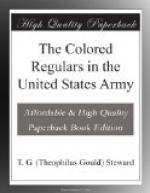“We landed in rowboats, amid, and after the cessation of the bombardment of the little hamlet and coast by the men-of-war and battle-ships,” writes a brave soldier of the Twenty-fifth Infantry, and adds immediately: “We then helped ourselves to cocoanuts which we found in abundance near the landing.” Ordinarily this statement, so trivial and apparently unimportant, would not merit repetition, but in its connection here it is significant as showing the immediate tendency of the men to resort to the fruits of the country, despite all warnings to the contrary. The two weeks’ experience on board the transports had made the finding of cocoanuts an event to be noted, and the dry pulp and strongly flavored milk of this tropical fruit became extremely grateful to the palate, even if not altogether safe for the stomach. If ripe, however, the cocoanut could scarcely be more ungenial to many, than the raw, canned tomatoes upon which they had in part subsisted during the voyage. It is to be added that this report of the finding of the cocoanuts is not the report of an old soldier, but of a young and intelligent, first enlistment man.
Lawton’s Division soon after landing, was ordered to move forward in the direction of Santiago, on the road leading past Siboney. A staff officer, writing of that movement, says: “General Lawton, with his Division, in obedience to this order, pushed forward from Daiquiri about five miles, when night overtook him and he bivouacked on the road.” An old soldier of the Twenty-fifth, writing me from the hospital in Tampa, Florida, July 22nd, says of the same event: “After the regiment landed we marched about four and a half miles through the mountains; then we made camp.” The old soldier says nothing of cocoanuts, but makes his statement with as much accuracy as possible, and with no waste of words. The novice describing the same thing says: “A short distance ahead (from the shore) we bivouacked for the night. We were soon lying in dreamland, so far from friends and home, indeed, on a distant, distant shore.” These two extracts show at once the difference between the soldier produced by years of trial and training on our plains, and the soldier who but yesterday was a civilian. With the one the march is a short distance; with the other it is about four and a half miles; one reports that they “made camp,” the other talks of dreamland, friend, home and distant shore; one expresses his feelings, the other shows control of feeling and reserve in expression.
That first night on Cuban soil, the night following June 22nd, was one without events, but one of great concern to the commanders on shore and on the fleet. The work of disembarking had gone on successfully, and already about six thousand men were on shore. Nearly the whole of Lawton’s Division, with Bates’ independent brigade, were bivouacked, as we have seen, about five miles from Daiquiri, exactly where the railroad crosses the wagon road leading




